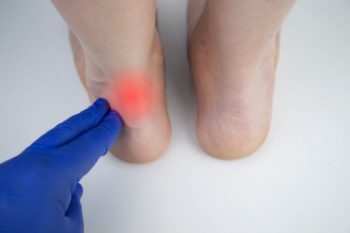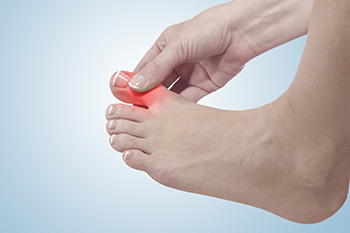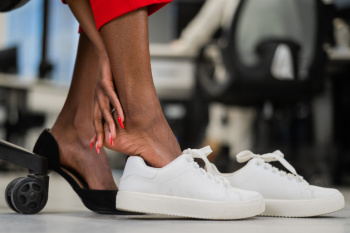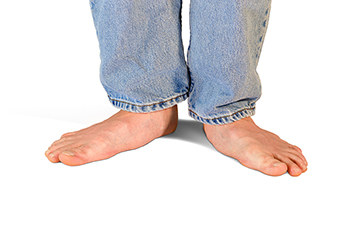Blog
Items filtered by date: September 2024
Achilles Pain From Achilles Tendinopathy

Achilles tendinopathy, or Achilles pain, is common among athletes, particularly in sports involving running, jumping, and sudden changes in direction. It occurs when the Achilles tendon becomes overworked due to repetitive strain, often from overtraining, poor technique, or wearing inadequate footwear. Athletes in sports like basketball, soccer, or track and field are especially prone. Symptoms include stiffness and pain along the back of the heel, particularly after physical activity or intense workouts. Ignoring these symptoms can lead to chronic pain or even a tendon rupture, sidelining athletes for extended periods of time. Diagnosis typically involves a physical examination and sometimes imaging like ultrasound or MRI scans to determine the severity. Treatment focuses on rest. For prevention, athletes should engage in proper warm-up, cooldown routines, and wearing the right footwear. If you engage in sports and have incurred an Achilles tendon injury, it is suggested that you visit a podiatrist for a proper diagnosis and care.
Sports related foot and ankle injuries require proper treatment before players can go back to their regular routines. For more information, contact Dwayne A. Lay, DPM of Elite Foot and Ankle. Our doctor can provide the care you need to keep you pain-free and on your feet.
Sports Related Foot and Ankle Injuries
Foot and ankle injuries are a common occurrence when it comes to athletes of any sport. While many athletes dismiss the initial aches and pains, the truth is that ignoring potential foot and ankle injuries can lead to serious problems. As athletes continue to place pressure and strain the area further, a mild injury can turn into something as serious as a rupture and may lead to a permanent disability. There are many factors that contribute to sports related foot and ankle injuries, which include failure to warm up properly, not providing support or wearing bad footwear. Common injuries and conditions athletes face, including:
- Plantar Fasciitis
- Plantar Fasciosis
- Achilles Tendinitis
- Achilles Tendon Rupture
- Ankle Sprains
Sports related injuries are commonly treated using the RICE method. This includes rest, applying ice to the injured area, compression and elevating the ankle. More serious sprains and injuries may require surgery, which could include arthroscopic and reconstructive surgery. Rehabilitation and therapy may also be required in order to get any recovering athlete to become fully functional again. Any unusual aches and pains an athlete sustains must be evaluated by a licensed, reputable medical professional.
If you have any questions please feel free to contact our office located in Canton, GA . We offer the newest diagnostic and treatment technologies for all your foot and ankle needs.
What Are the Causes of Big Toe Pain?

Big toe pain can be both uncomfortable and disruptive, often stemming from various underlying causes. One common culprit is gout, a form of arthritis caused by a buildup of uric acid crystals in the joint, leading to sudden, severe pain and swelling. Another potential cause is bunions, which occur when the big toe deviates towards the other toes, causing pain and pressure. Other issues include sesamoiditis, inflammation of the small bones under the big toe, and trauma or injury to the toe joint. Complications from untreated big toe pain include difficulties with walking and changes in gait, which may strain other joints and muscles. Accurate diagnosis and appropriate treatment are important to address these issues effectively. If you are experiencing persistent or severe pain in your big toe, it is suggested you make an appointment with a podiatrist for a thorough evaluation and tailored treatment plan.
Toe pain can disrupt your daily activities. If you have any concerns, contact Dwayne A. Lay, DPM of Elite Foot and Ankle. Our doctor can provide the care you need to keep you pain-free and on your feet.
What Causes Toe Pain?
Most severe toe pain is caused due to a sports injury, trauma from dropping something heavy on the toe, or bumping into something rigid. Other problems can develop over time for various reasons.
Toe pain can be caused by one or more ailments. The most common include:
- Trauma
- Sports injury
- Wearing shoes that are too tight
- Arthritis
- Gout
- Corns and calluses
- Hammertoe
- Bunions
- Blisters
- Ingrown toenails
- Sprains
- Fractures (broken bones)
- Dislocations
When to See a Podiatrist
- Severe pain
- Persistent pain that lasts more than a week
- Signs of infection
- Continued swelling
- Pain that prevents walking
Diagnosis
In many cases the cause of toe pain is obvious, but in others, a podiatrist may want to use more advanced methods to determine the problem. These can range from simple visual inspections and sensation tests to X-rays and MRI scans. Prior medical history, family medical history, and any recent physical traumatic events will all be taken into consideration for a proper diagnosis.
Treatment
Treatments for toe pain and injuries vary and may include shoe inserts, padding, taping, medicines, injections, and in some cases, surgery. If you believe that you have broken a toe, please see a podiatrist as soon as possible.
If you have any questions please feel free to contact our office located in Canton, GA . We offer the newest diagnostic tools and technology to treat your foot and ankle needs.
Plantar Heel Pain

Plantar heel pain, commonly associated with plantar fasciitis, is characterized by sharp, stabbing pain at the bottom of the heel. It is especially noticeable with the first steps in the morning or after prolonged periods of sitting. This discomfort arises from inflammation of the plantar fascia, a thick band of tissue connecting the heel to the toes. Symptoms typically include a deep ache or a burning sensation in the heel, which may worsen with activity or after standing for long periods. Contributing factors include overuse, poor foot mechanics, and inadequate footwear. Effective treatment often involves rest and stretching exercises for the Achilles tendon and plantar fascia. Wearing supportive shoes with adequate cushioning and using orthotic inserts can also provide relief. In persistent cases, specialized exercises or corticosteroid injections may be considered. For a tailored treatment plan for plantar fasciitis, it is suggested you make an appointment with a podiatrist.
Plantar fasciitis can be very painful and inconvenient. If you are experiencing heel pain or symptoms of plantar fasciitis, contact Dwayne A. Lay, DPM from Elite Foot and Ankle. Our doctor can provide the care you need to keep you pain-free and on your feet.
What Is Plantar Fasciitis?
Plantar fasciitis is the inflammation of the thick band of tissue that runs along the bottom of your foot, known as the plantar fascia, and causes mild to severe heel pain.
What Causes Plantar Fasciitis?
- Excessive running
- Non-supportive shoes
- Overpronation
- Repeated stretching and tearing of the plantar fascia
How Can It Be Treated?
- Conservative measures – anti-inflammatories, ice packs, stretching exercises, physical therapy, orthotic devices
- Shockwave therapy – sound waves are sent to the affected area to facilitate healing and are usually used for chronic cases of plantar fasciitis
- Surgery – usually only used as a last resort when all else fails. The plantar fascia can be surgically detached from the heel
While very treatable, plantar fasciitis is definitely not something that should be ignored. Especially in severe cases, speaking to your doctor right away is highly recommended to avoid complications and severe heel pain. Your podiatrist can work with you to provide the appropriate treatment options tailored to your condition.
If you have any questions please feel free to contact our office located in Canton, GA . We offer the newest diagnostic and treatment technologies for all your foot and ankle needs.
Exercises for Building Arches in Flat Feet

Flat feet can lead to discomfort and other issues, but targeted exercises can help to build arch strength and improve flexibility. One beneficial exercise is the toe raise, where you stand with your feet flat and then slowly lift your heels off the ground while keeping your toes and the balls of your feet planted. This movement strengthens the muscles that support the arch. To enhance flexibility, incorporate stretches like the towel stretch, where you sit with your legs extended and use a towel to gently pull your toes towards you, stretching the calf muscles and Achilles tendon. Another effective stretch involves rolling your foot over a small ball or rolling pin to target the plantar fascia. Regularly performing these exercises can improve arch support and overall foot health. If you have flat feet and you are uncomfortable, it is suggested that you confer with a podiatrist who can help you to manage this condition.
Flatfoot is a condition many people suffer from. If you have flat feet, contact Dwayne A. Lay, DPM from Elite Foot and Ankle. Our doctor will treat your foot and ankle needs.
What Are Flat Feet?
Flatfoot is a condition in which the arch of the foot is depressed and the sole of the foot is almost completely in contact with the ground. About 20-30% of the population generally has flat feet because their arches never formed during growth.
Conditions & Problems:
Having flat feet makes it difficult to run or walk because of the stress placed on the ankles.
Alignment – The general alignment of your legs can be disrupted, because the ankles move inward which can cause major discomfort.
Knees – If you have complications with your knees, flat feet can be a contributor to arthritis in that area.
Symptoms
- Pain around the heel or arch area
- Trouble standing on the tip toe
- Swelling around the inside of the ankle
- Flat look to one or both feet
- Having your shoes feel uneven when worn
Treatment
If you are experiencing pain and stress on the foot you may weaken the posterior tibial tendon, which runs around the inside of the ankle.
If you have any questions please feel free to contact our office located in Canton, GA . We offer the newest diagnostic and treatment technologies for all your foot and ankle needs.
Are You Suffering From Ingrown Toenails?
Blog Archives
- March 2025
- February 2025
- January 2025
- December 2024
- November 2024
- October 2024
- September 2024
- August 2024
- July 2024
- June 2024
- May 2024
- April 2024
- March 2024
- February 2024
- January 2024
- December 2023
- November 2023
- October 2023
- September 2023
- August 2023
- July 2023
- June 2023
- May 2023
- April 2023
- March 2023
- February 2023
- January 2023
- December 2022
- November 2022
- October 2022
- September 2022
- August 2022
- July 2022
- June 2022
- May 2022
- April 2022
- March 2022
- February 2022
- January 2022
- December 2021
- November 2021
- October 2021
- September 2021
- August 2021
- July 2021
- June 2021
- May 2021
- April 2021
- March 2021
- February 2021
- January 2021
- December 2020
- November 2020
- October 2020
- September 2020
- August 2020
- July 2020
- June 2020
- May 2020
- April 2020
- March 2020
- February 2020
- January 2020
- December 2019
- November 2019
- October 2019
- September 2019
